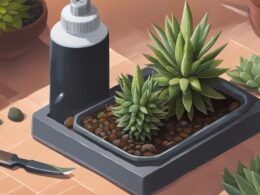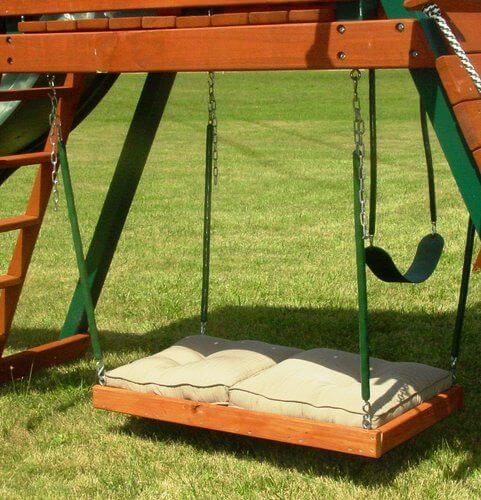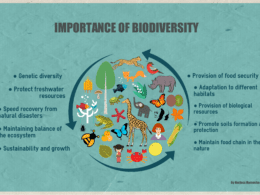Quick Summary
- Evaluate the condition of wood mulch before deciding how to dispose of it
- Repurpose wood mulch in the garden or compost it for soil enrichment
- Find a recycling center that accepts wood mulch for proper disposal
- Consider donating wood mulch to local farms or landscapers to support sustainability and reduce environmental impact
Evaluate the Condition of the Wood Mulch
You should carefully assess the condition of your wood mulch before deciding how to dispose of it. Evaluating the quality of the mulch is important for determining its usefulness and ensuring safety. Start by checking for any signs of mold or decay. If the mulch appears to be rotting or has a strong, unpleasant odor, it’s best to discard it. Mold can pose health risks, especially for individuals with allergies or respiratory issues. Next, consider the color and texture of the mulch. If it’s faded, dry, and crumbly, it may not be beneficial for your garden anymore. Additionally, look for any signs of pests or insect infestation. If you notice an excessive amount of insects or their nests, it may be best to remove the mulch to prevent further damage. Lastly, consider the overall appearance of the mulch. If it’s clumped together or has a slimy texture, it’s likely decomposing and should be disposed of properly. By evaluating the condition of your wood mulch, you can make an informed decision on how to dispose of it safely and effectively.Repurpose the Wood Mulch in Your Garden
Transform your garden into a lush oasis by creatively incorporating the earthy remnants of your landscaping project. Don’t let your wood mulch go to waste! Instead, repurpose it in your garden to reap the many benefits it offers. Here are four repurposing techniques to consider:- Weed Control: Spread a layer of wood mulch around your plants to suppress weed growth. This’ll save you time and effort by reducing the need for frequent weeding.
- Moisture Retention: Wood mulch acts as a natural barrier, helping to retain moisture in the soil. By using it in your garden, you can reduce water evaporation and maintain optimal hydration for your plants.
- Nutrient Enhancement: Over time, wood mulch breaks down and enriches the soil with essential nutrients. This organic matter improves soil structure, promotes healthy root growth, and enhances overall plant health.
- Erosion Prevention: By placing wood mulch on slopes or areas prone to erosion, you can prevent soil runoff and protect your garden from damage.
Compost the Wood Mulch
To compost the wood mulch in your garden, you can start by creating a compost pile or bin. This will provide a designated area for the wood mulch to decompose and turn into nutrient-rich compost. Once you have your compost pile or bin set up, you can layer the wood mulch in with other compostable materials such as kitchen scraps, yard waste, and leaves. This will help create a balanced compost mix and speed up the decomposition process.Create a Compost Pile or Bin
Start by gathering your wood mulch and finding a suitable spot for your compost pile or bin. Composting your wood mulch has many benefits, such as reducing waste and improving soil quality. To create a compost pile or bin, follow these simple steps:- Choose a location: Find a spot that’s convenient for you and has good drainage. Avoid placing it near your home or any structures.
- Build the base: Start by layering a mix of organic materials like wood mulch, leaves, and kitchen scraps. This’ll provide a good balance of carbon and nitrogen.
- Maintain and turn: Regularly add more wood mulch and other organic materials to your pile. Make sure to turn it every few weeks to aerate and accelerate the decomposition process.
Layer the Wood Mulch in Your Compost
Enhance your compost pile by layering in the nutrient-rich organic material for optimal decomposition. When it comes to disposing of wood mulch, don’t throw it away! Instead, consider using it to boost your compost pile. Wood mulch is not only great for weed prevention and moisture retention in your garden, but it can also add aesthetic appeal as a decorative element. To incorporate wood mulch into your compost, start by creating a layer of green materials such as kitchen scraps or grass clippings. Then, add a layer of wood mulch on top. This will help balance the carbon-to-nitrogen ratio in your compost, promoting faster decomposition.
Repeat this process until your compost pile reaches the desired height. Remember to turn your compost regularly to ensure proper aeration and decomposition. By incorporating wood mulch into your compost, you can create nutrient-rich soil for your garden while reducing waste.
Wood mulch is not only great for weed prevention and moisture retention in your garden, but it can also add aesthetic appeal as a decorative element. To incorporate wood mulch into your compost, start by creating a layer of green materials such as kitchen scraps or grass clippings. Then, add a layer of wood mulch on top. This will help balance the carbon-to-nitrogen ratio in your compost, promoting faster decomposition.
Repeat this process until your compost pile reaches the desired height. Remember to turn your compost regularly to ensure proper aeration and decomposition. By incorporating wood mulch into your compost, you can create nutrient-rich soil for your garden while reducing waste.
Find a Recycling Center for Wood Mulch
First, locate a recycling center near you that accepts wood mulch so you can dispose of it properly. It’s important to find alternatives to simply throwing away wood mulch, as it has many benefits for your garden and the environment. Recycling centers are the best option for disposing of wood mulch because they have the proper facilities to handle it safely and efficiently. When looking for a recycling center, consider safety as a top priority. Look for a center that follows proper safety protocols and has a good track record of handling wood mulch. This will ensure that the disposal process is done in a way that minimizes any potential hazards. Once you’ve located a recycling center, gather all the wood mulch you want to dispose of and transport it safely to the facility. Make sure to secure the mulch properly during transportation to prevent any accidents on the road. At the recycling center, the wood mulch will be properly processed and turned into useful products like compost or fuel. This helps to reduce waste and lessen the environmental impact of disposing of wood mulch. By finding a recycling center for your wood mulch, you’re not only disposing of it properly but also contributing to a more sustainable and eco-friendly way of managing garden waste. So take the time to find a recycling center near you and do your part in protecting the environment.Use the Wood Mulch for Erosion Control
One effective way to prevent soil erosion and promote stability in your garden is by utilizing wood mulch. By spreading a layer of wood mulch over the soil, you can create a protective barrier that helps prevent erosion. The mulch acts as a shield, preventing rainwater from washing away valuable topsoil and exposing your plants’ roots. Using wood mulch for erosion control not only helps protect your garden, but it also has a positive environmental impact. When rainwater runs off, it can carry pollutants and chemicals from the soil into nearby water sources. By using wood mulch, you can reduce the amount of runoff and decrease the risk of water pollution. To effectively use wood mulch for erosion control, start by preparing the area. Remove any weeds or debris. Then, evenly spread a layer of wood mulch over the soil, making sure to cover the entire area. The mulch should be thick enough to provide adequate protection against erosion but not too thick that it suffocates your plants. Remember, when using wood mulch for erosion control, it’s important to choose a type of mulch that’s safe for your garden and the environment. Avoid using mulch that contains chemicals or dyes that could leach into the soil. Instead, opt for natural and organic wood mulch options for the best results.What Is the Best Type of Mulch to Use for Outdoor Palm Trees?
Choosing the best mulch for outdoor palm trees can significantly impact their growth and health. Consider factors like moisture retention and weed control when deciding. Organic mulches, such as shredded bark or wood chips, provide nourishment and protect roots. Although outdoor palm tree cost is important, prioritize the benefits offered by suitable mulch types.
Donate the Wood Mulch to Local Farms or Landscapers
If you’re looking for a way to dispose of your wood mulch responsibly, why not consider donating it to local farms or landscapers? Not only will you be helping these businesses, but you’ll also be contributing to a more sustainable and eco-friendly community. By donating your wood mulch, you can provide local farms with a valuable resource that can be used for various purposes. Farmers can use the mulch to enrich their soil, control weeds, and conserve moisture, ultimately leading to healthier crops and a more productive harvest.
Landscapers, on the other hand, can use the mulch to enhance the aesthetics of gardens and outdoor spaces, creating beautiful and sustainable landscapes for everyone to enjoy.
By donating your wood mulch, you can provide local farms with a valuable resource that can be used for various purposes. Farmers can use the mulch to enrich their soil, control weeds, and conserve moisture, ultimately leading to healthier crops and a more productive harvest.
Landscapers, on the other hand, can use the mulch to enhance the aesthetics of gardens and outdoor spaces, creating beautiful and sustainable landscapes for everyone to enjoy.
- Your donation can help local farms thrive and support the local economy, giving you a sense of fulfillment and pride in your community.
- By donating your wood mulch, you’re diverting waste from the landfill, reducing environmental impact, and promoting sustainability.
- Supporting local farms and landscapers can foster a sense of connection and collaboration within your community, creating a safer and more vibrant environment for all.
Consider Using it for Fuel or Energy Production
Consider repurposing your excess wood mulch by using it as a sustainable source of fuel or energy, allowing you to not only reduce waste but also contribute to a greener and more eco-conscious lifestyle. Instead of disposing of your wood mulch, you can explore fuel alternatives that can help minimize environmental impacts. One option is to convert the wood mulch into biomass fuel, which can be used to generate heat or electricity. To utilize wood mulch as biomass fuel, you can invest in a wood pellet stove or boiler. These appliances are designed to burn wood pellets efficiently, providing a source of renewable energy for heating your home. By using wood mulch in this manner, you can reduce your reliance on fossil fuels and decrease your carbon footprint. However, it’s important to ensure safety when using wood mulch as fuel. Make sure to follow the manufacturer’s guidelines for your wood pellet stove or boiler. Regular maintenance and cleaning are necessary to prevent the buildup of creosote, a flammable substance that can cause chimney fires. Repurposing your excess wood mulch as a fuel source is an excellent way to reduce waste and contribute to a more sustainable lifestyle. By exploring fuel alternatives and being mindful of safety, you can not only save money but also help protect the environment.Take Precautions When Disposing of Treated Wood Mulch
To ensure the safety of your environment, it’s essential to take precautions when getting rid of treated wood mulch. Treated wood mulch can contain chemicals that pose potential health risks if not handled properly. Here are four important precautions to keep in mind:- Wear protective clothing: When handling treated wood mulch, make sure to wear gloves, long sleeves, and pants to minimize direct contact with your skin. This will help protect you from any potential chemicals present in the mulch.
- Avoid inhalation: Breathing in dust or particles from treated wood mulch can be harmful. To prevent this, wear a mask or respirator when working with the mulch and avoid creating dust clouds while handling it.
- Dispose of properly: Treated wood mulch should not be burned or used as compost, as the chemicals can be released into the air or soil. Instead, contact your local waste management facility to find out the appropriate way to dispose of it.
- Keep children and pets away: Treated wood mulch should be kept out of reach of children and pets to prevent accidental ingestion or contact. Store it in a secure location until it can be properly disposed of.








